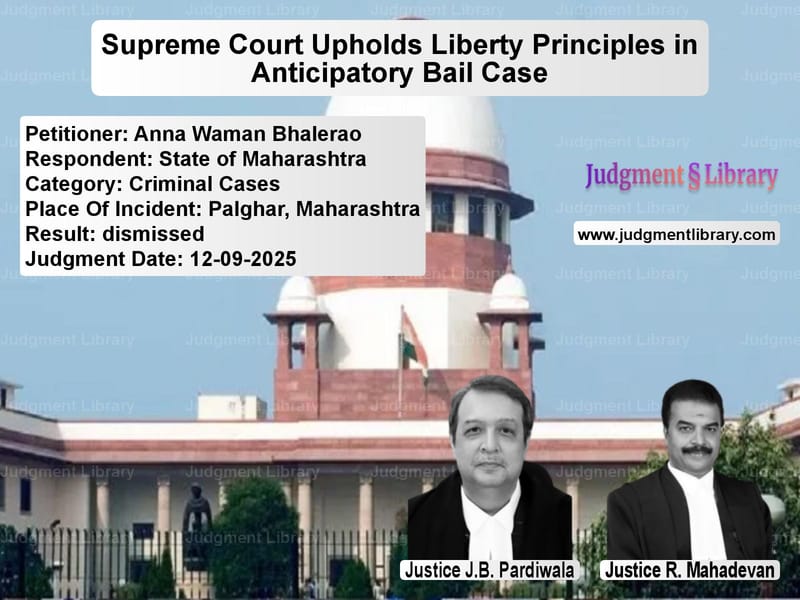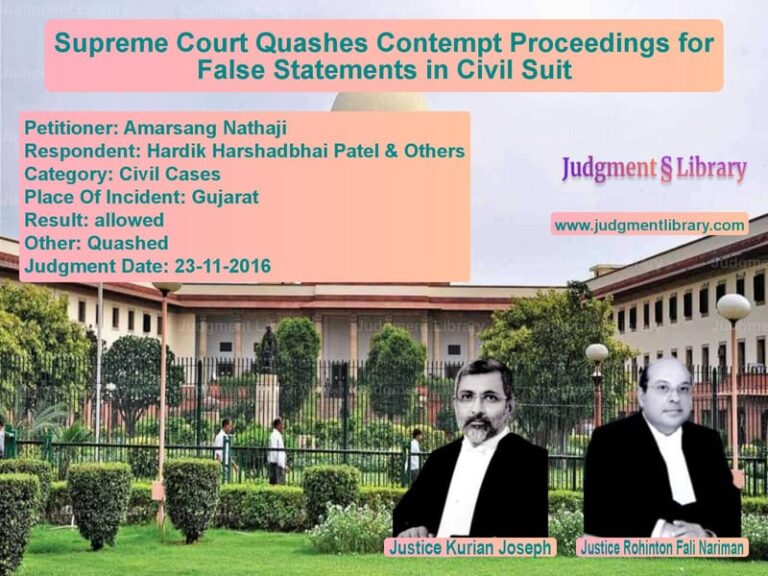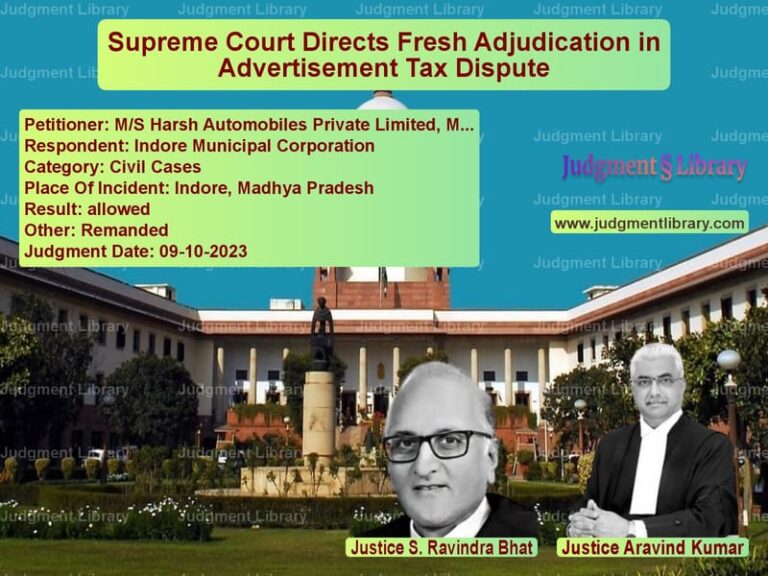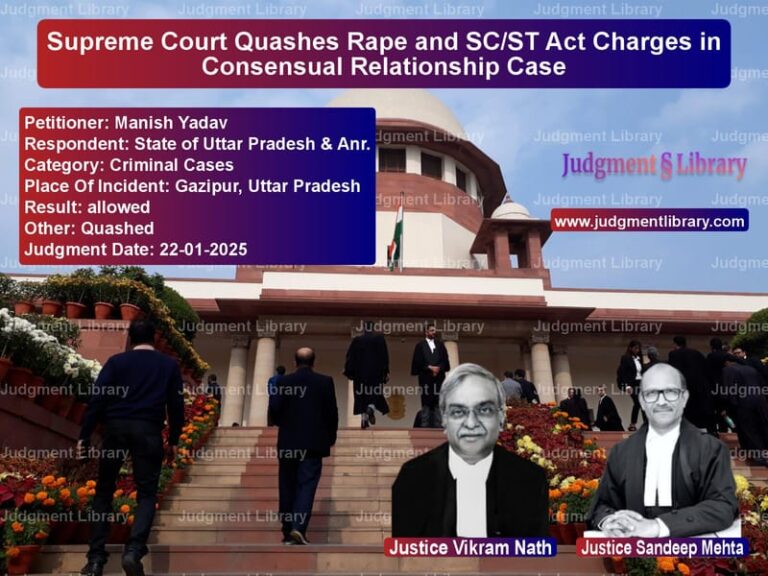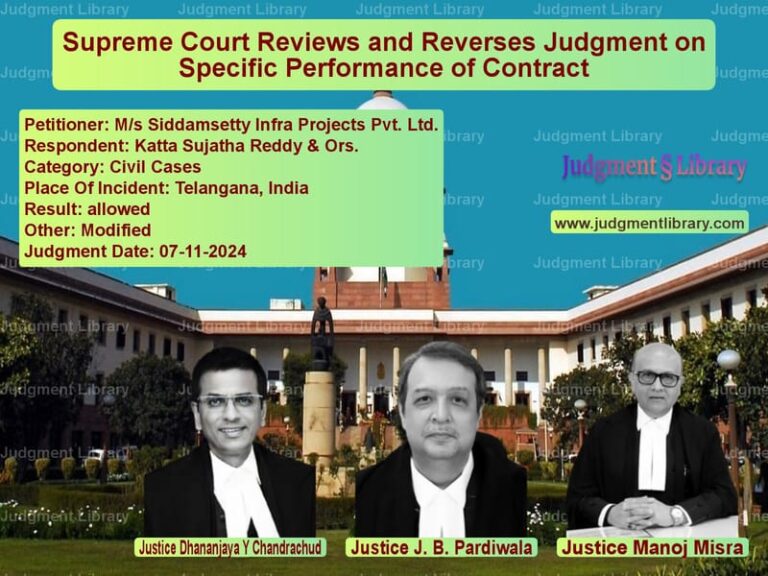Supreme Court Upholds Liberty Principles in Anticipatory Bail Case
In a comprehensive judgment that balances individual liberty with the needs of criminal investigation, the Supreme Court of India recently addressed a significant anticipatory bail case while also issuing crucial directions to protect citizens’ fundamental rights. The case involved Anna Waman Bhalerao and another appellant who sought anticipatory bail in connection with FIR No. 30/2019 registered at Arnala Sagari Police Station, District Palghar, Maharashtra.
The Case Background
The legal dispute originated from a complaint lodged by Vikas Narsingh Vartak concerning property fraud allegations. The FIR was registered against Mahesh Yashwant Bhoir and others for offences punishable under Sections 420, 463, 464, 465, 467, 468, 471 and 474 read with Section 34 of the Indian Penal Code, 1860. The case involved allegations that land bearing Survey No. 29, Hissa No. 1 and Survey No. 233, Hissa No.1(A), admeasuring 1.46 hectares situated at Village Agashi, was fraudulently transferred through forged documents.
The appellants, who were serving as Circle Officer and Talathi respectively in the Revenue Department of the State of Maharashtra at the relevant time, were later arraigned as Accused Nos. 5 and 6. The allegation against them was that in their official capacity, they had certified mutation entries on the basis of forged documents, thereby facilitating the illegal transfer of ownership of the immovable property.
The Appellants’ Arguments
The learned Senior Counsel appearing for the appellants presented several compelling arguments. He contended that “the appellants, who were serving as Circle Officer and Talathi respectively at the relevant time and have since retired, acted purely in their official capacity while certifying mutation entries on the basis of a registered sale deed presented before them. They had no role in the creation or execution of the alleged forged powers of attorney or sale deed, nor any direct link with the subsequent transfer in favour of A1.”
The counsel emphasized that “there is also no allegation of personal gain, dishonest intention, or conspiracy. The only act attributed to them is certification of mutation entries on the strength of facially valid documents.” He further argued that “in the absence of material to show knowledge of forgery, dishonest inducement, or collusion, the essential ingredients of the offences under Sections 420, 463, 467, 468, and 471 IPC are not attracted.”
Another significant point raised was the delay in prosecution. The counsel pointed out that “the FIR was lodged after an unexplained delay of over 20 years from the alleged incident of 1996. The complainant, being aware of the cancellation in 1998, remained silent for two decades. Such extraordinary delay gravely prejudices the appellants’ right to a fair investigation and defence.”
The Supreme Court’s Analysis
The Supreme Court, comprising Justices J.B. Pardiwala and R. Mahadevan, conducted a thorough examination of the case. The Court noted that “the FIR pertains to events of 1996-98 and the allegation against the appellants is that, on the strength of forged and fabricated documents, fraudulent entries were made in the mutation register, facilitating the illegal transfer of ownership.”
The Court acknowledged that “the appellants were serving as Circle Officer and Talathi, and they retired from service in 2013 and 2019 respectively. The FIR itself was lodged after a delay of more than 20 years from the alleged incident, and no departmental proceedings were initiated against the appellants either during their service or after retirement.”
However, the Court also considered the gravity of the allegations, stating that “the High Court rightly noted that the alleged powers of attorney were executed in 1996 long after the death of the original owners and that the sale deed dated 18.05.1996 executed on the strength of such documents, is prima facie vitiated.”
The Court made a crucial observation about balancing competing interests: “We are conscious of the fact that whether the appellants shared any criminal intent or abetted the acts of A1 is a matter for trial, and any conclusive finding at this stage would be inappropriate. However, while considering anticipatory bail, this Court must balance the liberty of individuals against the legitimate requirements of investigation.”
Broader Principles of Liberty
While deciding the specific case, the Supreme Court used the opportunity to elaborate on fundamental principles of personal liberty. The Court extensively discussed the historical evolution of bail rights, tracing them back to Magna Carta. The judgment quoted from Nikesh Tarachand Shah v. Union of India, where Justice R. F. Nariman observed: “The provision for bail goes back to Magna Carta itself. Clause 39, which was, at that time, written in Latin, is translated as follows: ‘No free man shall be seized or imprisoned or stripped of his rights or possessions, or outlawed or exiled, or deprived of his standing in any other way, nor will we proceed with force against him, or send others to do so, except by the lawful judgment of his equals or by the law of the land.'”
The Court emphasized the constitutional significance of personal liberty, stating that “All human beings are born with some unalienable rights like life, liberty and pursuit of happiness. The importance of these natural rights can be found in the fact that these are fundamental for their proper existence and no other right can be enjoyed without the presence of right to life and liberty.”
Addressing Systemic Delays
A significant portion of the judgment focused on the problem of delayed disposal of bail applications. The Court expressed strong concern that “applications affecting personal liberty – particularly bail and anticipatory bail – ought not to be kept pending indefinitely. The grant or refusal of bail, anticipatory or otherwise, is ordinarily a straightforward exercise, turning on the facts of each case. There is, therefore, no justification for deferring decision-making and allowing a sword of Damocles to hang over the applicant’s head.”
The Court cited multiple precedents where it had previously emphasized the need for expeditious disposal of bail matters. In Rajanti Devi v. Union of India, the Court had directed that “Bail applications ought to be disposed of within a period of two weeks except if the provisions mandate otherwise, with the exception being an intervening application. Applications for anticipatory bail are expected to be disposed of within a period of six weeks with the exception of any intervening application.”
Landmark Directions
Based on its analysis, the Supreme Court issued comprehensive directions to protect citizens’ right to liberty:
“a) High Courts shall ensure that applications for bail and anticipatory bail pending before them or before the subordinate courts under their jurisdiction are disposed of expeditiously, preferably within a period of two months from the date of filing, except in cases where delay is attributable to the parties themselves.
b) High Courts shall issue necessary administrative directions to subordinate courts to prioritise matters involving personal liberty and to avoid indefinite adjournments.
c) Investigating agencies are expected to conclude investigations in long-pending cases with promptitude so that neither the complainant nor the accused suffers prejudice on account of undue delay.
d) Being the highest constitutional fora in the States, High Courts must devise suitable mechanisms and procedures to avoid accumulation of pending bail / anticipatory bail applications and ensure that the liberty of citizens is not left in abeyance.”
Final Outcome and Significance
While dismissing the specific appeals and affirming the High Court’s decision to reject anticipatory bail, the Supreme Court clarified that “the appellants shall be at liberty to apply for regular bail before the competent court, and if such an application is made, it shall be considered on its own merits, uninfluenced by any observations made by the High Court or by this Court in these appeals.”
This judgment represents a significant development in Indian jurisprudence concerning personal liberty and criminal procedure. By issuing specific timelines for disposal of bail applications and emphasizing the constitutional importance of personal freedom, the Supreme Court has taken a crucial step toward ensuring that the right to liberty is not compromised by procedural delays. The directions issued will likely have far-reaching implications for how courts across India handle bail applications, potentially reducing the uncertainty and anxiety that accused persons often face while awaiting decisions on their liberty.
Petitioner Name: Anna Waman Bhalerao.Respondent Name: State of Maharashtra.Judgment By: Justice J.B. Pardiwala, Justice R. Mahadevan.Place Of Incident: Palghar, Maharashtra.Judgment Date: 12-09-2025.Result: dismissed.
Don’t miss out on the full details! Download the complete judgment in PDF format below and gain valuable insights instantly!
Download Judgment: anna-waman-bhalerao-vs-state-of-maharashtra-supreme-court-of-india-judgment-dated-12-09-2025.pdf
Directly Download Judgment: Directly download this Judgment
See all petitions in Bail and Anticipatory Bail
See all petitions in Fraud and Forgery
See all petitions in Judgment by J.B. Pardiwala
See all petitions in Judgment by R. Mahadevan
See all petitions in dismissed
See all petitions in supreme court of India judgments September 2025
See all petitions in 2025 judgments
See all posts in Criminal Cases Category
See all allowed petitions in Criminal Cases Category
See all Dismissed petitions in Criminal Cases Category
See all partially allowed petitions in Criminal Cases Category

